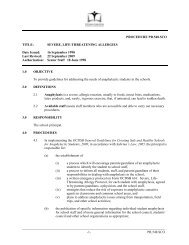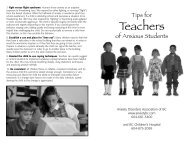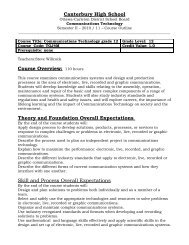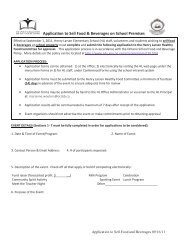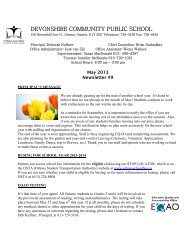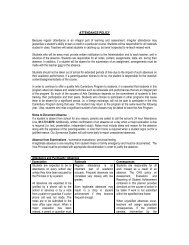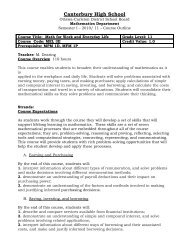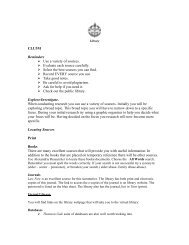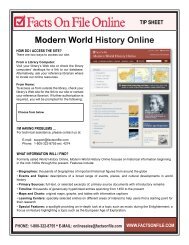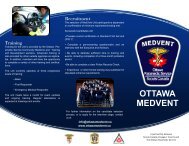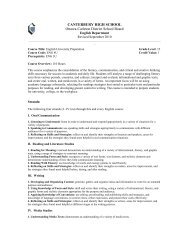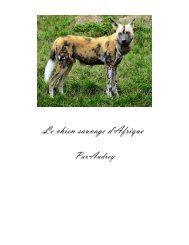Canterbury High School - Ottawa-Carleton District School Board
Canterbury High School - Ottawa-Carleton District School Board
Canterbury High School - Ottawa-Carleton District School Board
Create successful ePaper yourself
Turn your PDF publications into a flip-book with our unique Google optimized e-Paper software.
<strong>Canterbury</strong> <strong>High</strong> <strong>School</strong><br />
<strong>Ottawa</strong>-<strong>Carleton</strong> <strong>District</strong> <strong>School</strong> <strong>Board</strong><br />
Visual Art Department<br />
Semester II – 2010 / 11 – Course Outline<br />
Course Title: Visual Art Grade 12 (Arts <strong>Canterbury</strong>)<br />
Grade Level: 12<br />
Visual Arts, Grade 12, University/College Preparation<br />
Course Code: AVI4MK Credit Value: 1<br />
Prerequisite: Visual Arts, Grade 11, University/College<br />
Preparation. AVI3MK (Audition)<br />
Course Overview 110 hours<br />
This course focuses on the refinement of students skills and knowledge in visual arts. Students<br />
will analyse art forms; use theories of art in analysing and producing art; and increase their<br />
understanding of stylistic changes in modern and contemporary Western art, Canadian (including<br />
Native Canadian) art, and art forms from various parts of the world. Students will produce a body<br />
of work demonstrating a personal approach.<br />
Strands:<br />
Course Expectations<br />
Theory<br />
By the end of this course, students will:<br />
* use a wide range of appropriate terminology related to all areas of art theory to describe<br />
art works, crafts, and applied design forms;<br />
* demonstrate an understanding of modern and contemporary art, especially Canadian<br />
(including Native Canadian) art, as well as African, Oceanic, and Central and South American art;<br />
demonstrate an understanding of the historical context and stylistic evolution of some fine<br />
art, applied design, and craft forms.<br />
Creation<br />
By the end of this course, students will:<br />
* identify and develop ideas and concepts to shape and unify their own art works;<br />
* choose the materials, tools, techniques, themes, and processes best suited to their fine<br />
art, applied design, or craft forms, and use materials and tools safely;<br />
* produce a body of art work, using the stages of the creative process;<br />
* document and evaluate their creative process and art works, using portfolios<br />
Analysis<br />
By the end of this course, students will:<br />
* evaluate, individually and in groups, the effectiveness of their personal research,<br />
creative process, and art products;<br />
* analyse and evaluate modern and contemporary Western works of art, as well as<br />
selected works of fine art, works in applied design, and works in crafts from African,<br />
Oceanic, Central and South American, and emerging art communities;<br />
* analyse the role of critics and art criticism in the understanding of art;
* explain the influence of aspects of social, cultural, and political contexts, including<br />
arts organizations, on the creation and understanding of fine art, applied design, and craft<br />
works;<br />
* describe the relationship between the knowledge and skills acquired through<br />
visual arts and postsecondary educational opportunities.<br />
Units of Study<br />
Unit # TITLE Hours<br />
1 15% Experimental Drawing 15<br />
2 45% Mural Painting 60<br />
3 30% Art History 30<br />
4 10% Graduate Exhibition 5<br />
Experimental Drawing. Student will create a series of works based on the elements and<br />
principals of design using a found object as a catalyst for exploration in mixed media.<br />
Mural Painting. Students will develop a mural proposal for a mural to be displayed in the<br />
school or donated to the <strong>Ottawa</strong> General Hospital. Murals will be based on a personal theme,<br />
concept or idea and developed in large scale using acrylic paint on masonsite.<br />
Art History. Students will study Modern and Contemporary Art in Painting, Video, Sculpture,<br />
Photography and Installation, present a seminar, write a mentor paper and complete an Art<br />
History exam at the end of the unit.<br />
Graduating Exhibition. Students will prepare an exhibition reflecting their work in the Arts<br />
<strong>Canterbury</strong> program focusing on the works created in their final semester.<br />
Teaching Strategies<br />
o teacher demonstration investigative research<br />
o written assignments models<br />
o brainstorming student/teacher conferencing<br />
o small group work portfolios<br />
o field trips<br />
o department video and library resources<br />
o skill development and review<br />
o exemplars<br />
Assessment and Evaluation Strategies<br />
o observation (formal and informal)<br />
o portfolios<br />
o sketchbooks<br />
o self evaluation<br />
o written work<br />
o artist statements<br />
exhibition
Assessment and Evaluation:<br />
(Based on school assessment and evaluation policies and Visual Art expectations)<br />
Determination of Final Grade<br />
70% of the grade will be based on evaluations conducted throughout the course.<br />
•<br />
• Knowledge/Understanding 15%<br />
• Thinking/Inquiry 15%<br />
• Communication 15%<br />
• Application 25%<br />
30% of the final grade in all courses will be based on a final evaluation that will be administered<br />
at or towards the end of the course.<br />
• This summative evaluation may take the form of an examination, portfolio, class test,<br />
essay, and/or other methods of evaluation suitable to the course content in specific areas<br />
of study .<br />
• The summative evaluation process will allow the students to fully demonstrate the key<br />
course expectations across the four Achievement Chart categories.<br />
Attendance:<br />
• Due to regular attendance being an integral part of learning and assessment, irregular<br />
attendance may jeopardize a student’s ability to earn a credit in a particular course.<br />
Students will be responsible for all materials studied in classes. (OCDSB-Evaluation Policy<br />
5.9.1) Teachers will assist students in catching up but are not expected to re-teach<br />
missed work.<br />
• Under no circumstances will marks of “0” be assigned for tests, assignments, etc. missed<br />
for legitimate documented reasons. (OCDSB Policy 5.9.3)<br />
Learning Skills:<br />
• The report card provides a record of the learning skills demonstrated by students in every<br />
course, in the following five categories: Works Independently, teamwork, Organization,<br />
Work Habits, and Initiative. The separate evaluation and reporting of learning skills in<br />
these five areas reflects their critical role in students’ achievement of the curriculum<br />
expectations.<br />
Academic Honesty: (board policy)<br />
• If a student participates in academic fraud (e.g. cheating on tests, plagiarism in<br />
assignments_ he/she is deemed not to have met the expectations associated with that<br />
particular grading activity; a mark of zero will be assigned



